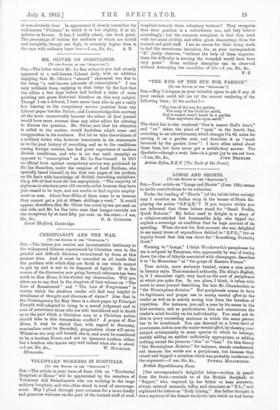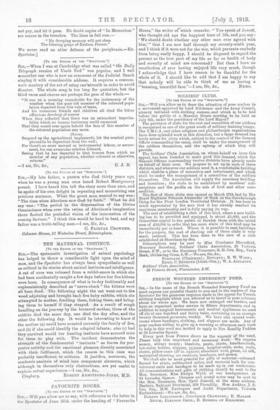LONGS AND SHORTS.
[To rut EDITOR OF THZ "SPICTATOISt"]
SIR,—Your article on "Longs and Shorts" (June 12th) seems to invite contributions to its collection.
Under the heading of " Shorts " (of the initial-letter variety) may I mention an Indian shop in the bazaar at Simla dis- playing the notice " S.P.Q.R." P If you inquire within you are informed that these letters stand for "Small Profits, Quick Returns." My father used to delight in a story of a religious-minded but businesslike lady, who tipped her nephew a sovereign on condition that he kept account of its spending. When she saw his first account she was delighted to see many items of expenditure debited to " S.P.G.," but on inquiry found that this was short for " Something, Probably Grub."
Turning to " Longs," I think Wordsworth's paraphrase for tea is eclipsed by Tennyson, who, apparently by way of toning down the idea of hilarity associated with champagne, describes it in "In Memoriam" as "the grape of Eastern France."
Your article, more seriously treated, raises a nice point in literary style. That standard authority, The King's English, is, if I remember right, very hard on the sort of periphrasis at which you poke fun. In one place, I think, it refers with scorn to some journal describing the late Mr. Chamberlain as "the Birmingham dictator." But periphrasis seems to have its legitimate and proper use in saving mental effort to the reader as well as in merely saving him from the boredom of repetition. For instance, you call a man by his name in the first sentence, and so particularize him and concentrate the reader's mind forcibly on his individuality. You need not do this in every succeeding sentence in which the same person has to be mentioned. You can descend to a lower level of preciseness, and so save the reader mental effort, by classing your subject subsequently in some species to which he belongs, merely adding an epithet sufficiently appropriate, or adding nothing except the pronoun " this " or "that" On this theory " the Birmingham dictator," for instance, stands condemned, not because the words are a periphrasis, but because they raised and begged a question which was probably irrelevant to [Our correspondent's delightful letter—written in pencil from the front—reminds us of the British Backfisch, or " flapper," who, required by her father to keep accounts, always entered caramels, toffee, and chocolate as "B.L.," and explained the letters as "Body Lining." Her father thought it was a mystery of the female wardrobe into which he had better not pry, and let it pass. No doubt copies of "In Memoriam" are scarce in the trenches. The lines in full run :—
" My drooping memory will not shun
The foaming grape of-Eastern France."
We never read an abler defence of the periphrasis.—ED. Spectator.]











































 Previous page
Previous page